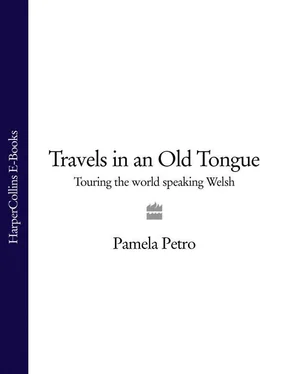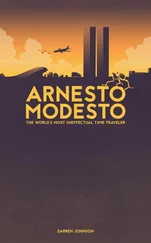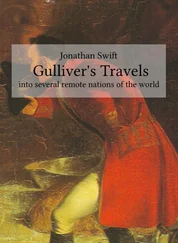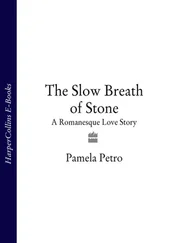But I did need speaking practice. Tom’s computer in New York had also turned up an on-line Welsh course that went out to hundreds of learners around the world. Remarkably, the guy who produced it lived about ten minutes away from me in East Providence. The world was shrinking and I hadn’t even found affordable luggage yet. I looked him up in the phone book and we agreed I’d come over on a Thursday evening to speak Welsh.
Mark Nodine is an American computer jockey who visited Wales once on a two-week vacation and decided to learn the language. That seemed excessive even to me. I imagined he could speak rings around me and downed a big glass of wine to lure my vocabulary out of its usual cocoon before appearing on his doorstep with a bunch of supermarket daffodils. Mark was waiting for me. He projected earnestness and clean living. I sucked in my breath after the prerequisite Noswaith dda – Good evening – so he wouldn’t smell the wine. My stomach ached.
I sat on his sofa and he drew up a chair. He spoke. I tilted my head like a parrot. He spoke again and I tilted again, smiling mightily. I couldn’t understand a word he said. His vocabulary seemed arcane and his rhythm – the syncopated, palpitating heartbeat of the Welsh language – fell into a monotone like the pulse of a long-distance runner. I, meanwhile, had rhythm. Sometimes I even had music. But I could ask my Welsh language memory for nothing more than an occasional unconjugated verb followed by an inblown hiss of winy breath. Forty-five unintelligible minutes later I suddenly remembered an important phone call I had to make. On the way out Mark told me he’d learned Welsh from the Bible.
‘I didn’t understand a word. Do you hear me? Not a single word,’ I cried to Marguerite later, clutching the rest of the Merlot.
‘But you’ve been studying all the time.’ She looked concerned.
‘Get this,’ I whimpered, ‘he learned Welsh by reading the Bible. Can you believe that? Jeez, the Bible! And now he’s creating this mega Welsh vocabulary program on the computer. How does he have time for that? He’s got a job. He’s got a wife and kids. Man, I hate that.’
‘So he probably speaks in Welsh thees and thous and uses verbs like smite. How could you possibly understand him?’
Coulda shoulda woulda, I thought darkly, but time for fear was running out. I painstakingly wrote the Shimizu girls. Marguerite spent Easter weekend summing up her thoughts on Brazilian fiction. Responses from Welsh societies began to trickle in: a Welsh Studies Centre in Germany would be happy to see me, same with the Paris Welsh, and the Dutch. A hearty invitation arrived from the Argentinians. No word from Asia, but for a letter from a very old Japanese Celticist who was in the hospital with pulmonary emphysema. He wrote wishing me luck from his hospital bed. The Mashonaland letter came back from Zimbabwe stamped ‘Return to Sender’. The travel agent demanded an audience.
‘You can’t go below the equator,’ she said matter-of-factly.
‘Why?’
‘It’s just a hemisphere thing. Most round-the-world packages don’t.’
‘That discriminates against Brazil,’ said Marguerite.
‘You’ll have to buy a separate ticket from New York to Buenos Aires, but now you have more immediate concerns. You have to choose your round-the-world route today.’
With less than half the response letters in, selecting an air path was like taking so many shots in the dark. We closed our eyes, drew our travel bow and shot: New York – London – Paris – Frankfurt – Athens – Frankfurt – Bombay – Singapore – Bangkok – Tokyo – Hong Kong – Tokyo – New York, followed by New York – Buenos Aires-Rio-New York. For better or worse, it was done. We were committed.
Then life speeded up. The director of the language course I’d attended in Lampeter sent me names and addresses of all the overseas learners who’d attended the programme in the past two years: it seemed Poles, Germans, Swedes, South Africans and Argentinians have all been flocking to Lampeter. I’d already heard something about Welsh being taught in a high school in Poland, and fired off a letter to Gdańsk. A last-minute invitation arrived from the Oslo Welsh, and I added another leg to the trip. Marguerite defended her dissertation. Hurricane Andrew beat the hell out of Florida every night in the kitchen. Mark called and told me (in English) about the ‘Welsh-L’, a Welsh-language chat group on the Internet and advised me to get E-mail.
This entailed wrestling a modem into my computer, which brought out a vindictive streak in its software. Over the next week it fought my every attempt to master the art of E-mail, by which I hoped to keep in touch with my editors, my brother, and the over four hundred yakkity Welsh-speakers who monopolized my E-mail box.
In the last, frantic days before we left I began to feel as if I were learning two languages at once: one, the synaptic slang of the twenty-first century, the very cutting edge of computer-speak itself; the other, possibly the oldest language in Europe, a contemporary version of Brythonic, the tongue that had been brought to the island of Great Britain around 600 B C (some argue for an even earlier date, around 2000 B C), and which, along with Basque, is the only language in Western Europe to have been spoken before, during and after the fall of the Roman Empire. It was a sweet, strange moment when I finally managed to unite the two on my computer screen.
This is the gist of one of the first messages I received on the Welsh-L (Welsh, Breton and Cornish are the official languages of the discussion group; English is tolerated, but frowned upon):
Sir John Morris-Jones, after a series of tests, has ascertained that the proportion of Welshmen who pronounce the double-L on the right side of the tongue, as compared to those who pronounce it on the left, is three to one.
Unlike most travel narratives this is not a book about place but a book about language. Can a language be said to describe a place, a place the language that is spoken there? Is it possible to travel to many different places and arrive, not back home, but in the terra incognita of a new language? And just where might that be?
I’ve travelled to Brazil with Marguerite but I don’t speak Portuguese. While we were there she read the signs, laughed at the jokes, and got drawn into the novelas , or nightly soap operas, that hold the country enrapt. I stared at the outcroppings of abrupt, conical hills that pock Rio de Janeiro and felt I’d slipped into the iconic backdrop of a medieval painting; I was consumed by the tangy tastes and smells of the place. Did my country of the viscera have the same boundaries as hers of the mind? Stumps me.
If these questions were simply knotty in Brazil they’re absolutely bound, gagged and tortured in Wales, where 82 per cent of the population does not speak Welsh. Are these English-speaking Welshwomen and -men just tourists in their homeland, as I was a tourist in Brazil, because they can’t read the old poets, hold a government teaching post or watch the nightly soap opera Pobl y Cwm ( People of the Valley )? Hardly. And yet … There is no self-governing political entity on earth that corresponds to Wales: it is not, to use geo-political terms, an historical nation. A leading Welsh academic, Gwyn A. Williams, wrote a book called When Was Wales? Might as well ask why is Wales? Because that’s where the sheep are? Because that’s where it rains all the time? Because that’s where Welsh is spoken?
Look at the two names of this twice-spoken-for land. ‘Wales’ comes from an old Saxon word meaning something like Place of the Romanized Foreigners. It’s an audacious etymology: around the fifth century AD Saxon invaders moved into Britain and called the inhabitants foreigners. They subdued most of the southern half of the island, and what they couldn’t they called Wales. The word Cymru – the Welsh name for Wales – was born around the year 580 in reaction to these events. The unconquered people who spoke Brythonic, the ancestor to Welsh as Anglo-Saxon is to English, called their bit of high, rough, western Britain Cymru , or the Home of Fellow Countrymen (the word Cymry means Welshmen). As late as the 1180s, Gerald of Wales – ironically writing in Latin – noted, ‘To this day our country continues to be called Wales and our people Welsh, but these are barbarous terms.’
Читать дальше












